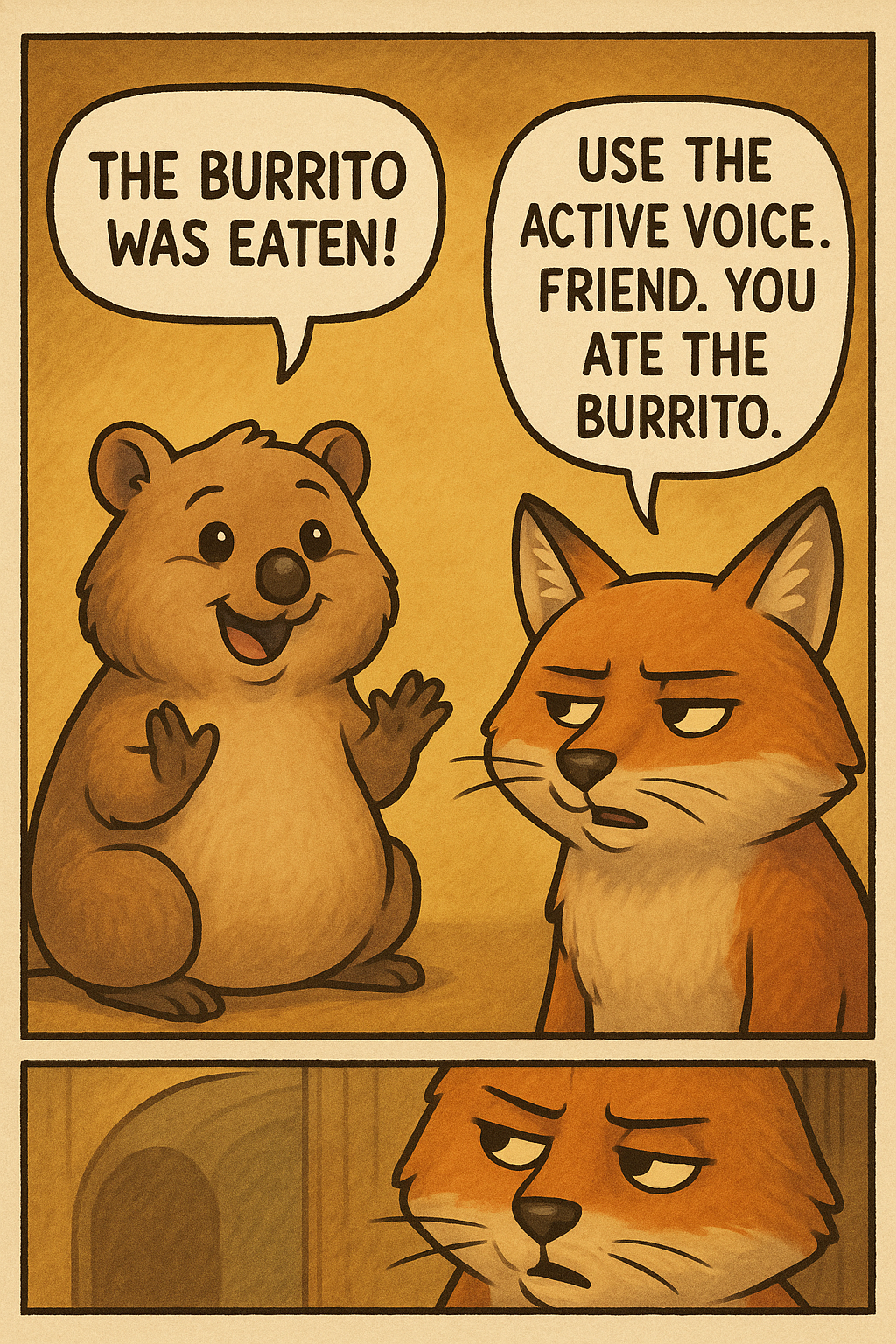Impara a costruire e usare tutte le forme passive: presente, passato, futuro, modali e oltre.
🎯 Obiettivo della lezione
In questa lezione imparerai a riconoscere, formare e usare correttamente la forma passiva in inglese. 📖
Vedrai:
- 🧱 Come si forma la passiva in tutti i tempi
- 🤔 Quando usarla e perché
- 🔁 Come trasformare una frase attiva in passiva
- ❌ Errori comuni degli italiani da evitare
- ✍️ Esercizi pratici e schemi riassuntivi
🌟 Cos’è la forma passiva?
La forma passiva si usa quando:
✅ Vogliamo dare importanza all’azione o al risultato (non a chi la compie)
✅ Il soggetto dell’azione non è noto, non è importante o è ovvio
✅ Vogliamo essere più formali o impersonali
Esempio attivo:
The chef cooked the meal. 👨🍳
➝ Esempio passivo:
The meal was cooked by the chef. 🍽️
🔍 Come si forma la passiva?
📌 Formula generale:
Soggetto (ricevente) + verbo “to be” (coniugato) + participio passato del verbo principale
🧩 Tabelle – Tutti i tempi passivi
| Tempo | Forma attiva | Forma passiva |
|---|---|---|
| Present Simple | He cleans the room. | The room is cleaned. 🧹 |
| Present Continuous | He is cleaning the room. | The room is being cleaned. 🧼 |
| Past Simple | He cleaned the room. | The room was cleaned. 🏠 |
| Past Continuous | He was cleaning the room. | The room was being cleaned. 🧽 |
| Present Perfect | He has cleaned the room. | The room has been cleaned. ✨ |
| Past Perfect | He had cleaned the room. | The room had been cleaned. 🧴 |
| Future Simple | He will clean the room. | The room will be cleaned. 🔮 |
| Future “going to” | He is going to clean the room. | The room is going to be cleaned. ⏳ |
| Modal (can, must, etc.) | He can clean the room. | The room can be cleaned. 💡 |
🧠 Approfondimento: Frasi con “by”
Spesso si usa by + agente per dire chi compie l’azione, ma solo se è importante.
The book was written by Orwell. 📚
The cake was eaten. 🎂 (non serve dire da chi)
🧠 Altre strutture passive utili
➤ Frasi con due oggetti (doppio complemento)
Attivo:
The teacher gave her a book.
➝ Passivo 1: She was given a book.
➝ Passivo 2: A book was given to her.
✅ Entrambe corrette!
❓Domande frequenti e chiarimenti
Quando uso la passiva invece dell’attiva?
✔ Quando non interessa chi compie l’azione
✔ Quando voglio essere impersonale (es. nei testi accademici)
✔ Quando il soggetto è sconosciuto o ovvio
Il verbo “to be” cambia con il tempo?
✔ Sì! È lui che si coniuga, mentre il verbo principale rimane al participio passato.
🚫 Errori comuni da evitare
| Errore ❌ | Corretto ✅ | Nota |
|---|---|---|
| The book is write by him. | The book is written by him. | “write” ➝ forma participio = “written” |
| The room is clean yesterday. | The room was cleaned yesterday. | Attento al tempo verbale |
| The letters was sent. | The letters were sent. | Plurale = “were” |
| The cake has eat. | The cake has been eaten. | Presente perfetto = has + been + pp |
🔄 Trasformazione attivo → passivo
1. Trova il complemento oggetto:
The chef cooked the meal.
2. Metti il complemento oggetto al posto del soggetto:
The meal…
3. Coniuga “to be” al tempo giusto:
The meal was
4. Aggiungi il participio passato:
The meal was cooked
5. Aggiungi “by + soggetto” solo se serve:
The meal was cooked by the chef
📋 Tabelle: Verbi irregolari frequenti (participio)
| Base | Past | Participio Passato | Significato |
|---|---|---|---|
| do | did | done | fare |
| write | wrote | written | scrivere |
| eat | ate | eaten | mangiare |
| see | saw | seen | vedere |
| give | gave | given | dare |
| take | took | taken | prendere |
| break | broke | broken | rompere |
🧠 Passive con modali
| Modale | Attiva | Passiva |
|---|---|---|
| can | He can fix the bike. | The bike can be fixed. 🚲 |
| must | You must close the door. | The door must be closed. 🚪 |
| should | They should respect the rules. | The rules should be respected. ⚖️ |
| may | She may open the window. | The window may be opened. 🪟 |
📝 Esercizi
Trasforma queste frasi in forma passiva:
- People eat pizza all over the world.
- Shakespeare wrote Hamlet.
- The police are investigating the case.
- They will deliver the package tomorrow.
- Someone has stolen my wallet!
✅ Soluzioni esercizi
- Pizza is eaten all over the world. 🍕
- Hamlet was written by Shakespeare. 🎭
- The case is being investigated by the police. 🕵️
- The package will be delivered tomorrow. 📦
- My wallet has been stolen. 👛
📌 Riepilogo finale
✔ La forma passiva si forma con to be + participio passato
✔ Si usa quando non è importante chi agisce, o per essere formali/impersonali
✔ Ricorda di adattare “to be” al tempo corretto
✔ Attento ai verbi irregolari
✔ Le frasi passive sono frequenti in testi scritti, notizie, istruzioni, accademici
